|
Tomorrow we celebrate the Solemnity of the Most Sacred Heart of Jesus. When we hear the name, “Most Sacred Heart of Jesus,” most of us probably think of a statue that appears in many of our churches.: the image where Jesus stands with his heart, burning with joy and love for us, exposed to all. Many of us probably do not think any deeper about this statue, and yet we are called to more. Pope Francis, in his 2013 homily on the Most Sacred Heart of Jesus, said, “It is more difficult to let God love us than to love Him! The best way to love Him in return is to open our hearts and let Him love us.” Every time we see these statues we are reminded to open ourselves to the love of Christ and give ourselves completely to him as he does. He lays his heart open before us as an example of how to live our lives.
The readings for the Solemnity also give us great insight into the importance of the Most Sacred Heart of Jesus and how we can relate it to our lives. The first reading comes from the Book of Deuteronomy, which means “second law.” The most striking part of this passage is where Moses says, “It was not because you are the largest of all nations that the Lord set his heart on you and chose you, for you are really the smallest of all nations. It was because the Lord loves you” (Dt 7:6-11). These words are not just a reminder of the covenant that the Lord made with Abraham, but a foreshadowing and reflection on the sacrifice of Christ on the cross. Christ literally lays down his life, sets down his heart for us, the insignificant people that we are. Why? Because he loves us. He gives us his whole self so that we, in some small way or another, might experience the love of God more fully. The heart on statues of the Most Sacred Heart of Jesus is exposed to show us that he is “sett[ing] his heart” on us, and it burns with his love for us. John, in his gospel passage 4: 7-16, expounds upon this idea of love and demonstrates for us how the covenant made between God and Abraham has been fulfilled in the Gospel. He explains to us that God is love and it is through our love for each other that we come to know God and serve him. John tells us about the importance of Christ’s sacrifice, “so that we might have life through him,” and while we have not seen God, he calls us to have faith: “No one has ever seen God. Yet, if we love one another, God remains in us, and his love is brought to perfection in us.” We are not led blindly into a community of faith, but rather we are given a simple rule, to love others as God loves us. By following this commandment we remain one with God. This is the message of the Most Sacred Heart of Jesus. This feast day reminds us that Jesus gave us the ultimate example of love, laying down one’s life for another, and thus he set his heart upon us. It is easy to forget the humanity of Christ, after all he is the Son of God, walked on water, and rose from the dead, and yet he bled for us. When the soldier pierced his side with a spear, out flowed blood and water. The Solemnity of the Most Sacred Heart of Jesus reminds us of Jesus’ humanity and the significance of his sacrifice. He suffered, he felt pain, he literally laid down his life and set his heart upon us. It is our turn to pick up what God has given us and share it with the world. Let us open our hearts and share Christ’s love. Nicholas Shields is a recent graduate of The Catholic University of America in Washington D.C. and Immediate Past Grand Knight of the CUA Knights of Columbus.
4 Comments
In his final words as Supreme Pontiff, Benedict XVI reminded us from the balcony of Castel Gandolfo that he was “simply a pilgrim beginning the last leg of his pilgrimage on Earth.” In doing so, he reminded us, the faithful, that we too are on an earthly pilgrimage. Benedict’s goal, as well as ours, is the Kingdom of Heaven. As pilgrims, we travel around and seek the ways that will lead us to our destination. Though at times we go down the wrong path, we trust that, having faith in God, He will always bring us back to our goal, to be with Him. Thus, we are truly a “Pilgrim Church,” a community of believers on a voyage to Christ.
This past Sunday, we celebrated the great solemnity of The Most Holy Body and Blood of Christ, also known as Corpus Christi. The history of the feast goes back all the way to the early 1200s in modern day Belgium. St. Juliana of Liege, a Norbertine canoness, had a vision of a full moon with a dark spot. The spot, she believed, represented the absence of a feast dedicated to the Blessed Sacrament outside the season of Lent. After reporting her visions to her confessor and bishop, the bishop instituted such a feast in the diocese in 1247. Several years later, Pope Urban IV extended the celebration to the universal church in 1261. It was he who requested St. Thomas Aquinas to write hymns for the feast day. We know them today as the Pange Lingua and Panis Angelicus. Urban successors, most especially Clement V in 1311, reinforced the original decree and promoted the observance of the feast. One of the most beautiful and traditional aspects of the celebration is the procession of the congregation behind the Eucharist encased in a monstrance. On a personal note, this day has always been one of my favorites growing up. I loved walking with my family and friends around the church building (often stopping traffic!), all following our pastor holding the monstrance up as high as he could. In many ways, the Corpus Christi procession mirrors our pilgrimage (our procession) on earth. Together, with other members of the faithful, we are led toward God, whose real presence on earth is in the Eucharist. The Most Blessed Sacrament is the point in which heaven and earth meet. Not only is it our guide on earth, but also our guide to heaven. Processing around, following the Eucharist is a reminder that what we do on earth can lead us to an everlasting reward. By receiving the Eucharist, we are given the strength (both spiritual and physical) to continue on our earthly journey. As St. Thomas Aquinas once wrote, “Per tuas semitas duc nos quo tendimus, ad lucem quam inhabitas” (By your ways lead us to where we are going, to the light where you live.) Victor David is a recent graduate of The Catholic University of America in Washington, D.C. A major contention that many people – both young and old – have with the Church is that it is an institution of “Thou Shalt Nots” and other moral imperatives that have little or no relevance in the modern world. In essence, the Church is seen as little more than an outdated social services agency, or even worse, a dismal and ahistorical museum perpetuating a false sense of reality. This emerging perception of the Church parallels a larger cultural shift from the acceptance of objective truth toward a secular relativism.
In a recent address to a group of U.S. bishops in Rome for their ad limina visit, Pope Benedict XVI proposed that the Church’s response to this “eroded” perception of reality is one of the greatest “spiritual and cultural challenges of the new evangelization.” Because of the Catholic Apostolate Center’s commitment to being an instrument of the new evangelization, this bears much significance on the direction of our work. But what impact does – or should – this emerging situation have on our daily lives? In the words of the Holy Father, “the Church in the United States is called, in season and out of season, to proclaim a Gospel which not only proposes unchanging moral truths but proposes them precisely as the key to human happiness and social prospering”. As Catholics, we are called to uphold the perceptive vision of reality that has been gifted to us by the Holy Spirit through Divine Revelation. It is only through upholding this vision that we can ever hope to accurately understand our place in the world around us and “the deepest truth about our being and ultimate vocation, our relationship to God.” As Catholics, we are beneficiaries of an astonishing intellectual legacy that was developed over the course of two millennia by scholars who examined these mysteries through the complimentary lenses of faith and reason. Contrary to popular opinion, the Church’s moral teaching is not merely a hodge-podge of archaic prohibitions, but a doctrine that is congruent with the logical nature of reality and informed by Divine Revelation. As the Pope explained in his address, the moral teaching of the Church “is not a threat to our freedom, but rather a ‘language’ which enables us to understand ourselves and the truth of our being, and so to shape a more just and humane world. She thus proposes her moral teaching as a message not of constraint but of liberation, and as the basis for building a secure future.” If we are to succeed in being apostles of the New Evangelization, then one of our most critical objectives should be to proclaim the beauty, consistency, and relevance of the Church’s moral teaching, without which we would be left with an incomplete view of our own humanity. Informed by this teaching, it is also important that we serve as prophets in the public sphere of these truths. As Pope Benedict XVI emphasized, “it is imperative that the entire Catholic community in the United States come to realize the grave threats to the Church’s public moral witness presented by a radical secularism which finds increasing expression in the political and cultural spheres.” Even more pertinent to the work of the Catholic Apostolate Center, the Holy Father went on to say that “the preparation of committed lay leaders and the presentation of a convincing articulation of the Christian vision of man and society remain a primary task of the Church in your country; as essential components of the new evangelization, these concerns must shape the vision and goals of catechetical programs at every level.” Blessed John XXIII was once quoted as saying the following: “We are not on earth to guard a museum, but to cultivate a flourishing garden of life.” The New Evangelization is not concerned with re-presenting a forgotten memory from the past, but with re-proposing the living and eternal truth of Jesus Christ that continues to sustain His Church. The Church’s moral teaching is just one part of this truth, but as the Holy Father makes clear, it is an essential part to humanity’s self-understanding. Brett Garland is a Collaborator with the Catholic Apostolate Center. Audio of the Holy Father’s address available here. CNS Report about the Holy Father's address. Editor's Note: This post was originally published in 2012. “Then God said, ‘Let Us make man in Our image, according to Our likeness; and let them rule over the fish of the sea and over the birds of the sky and over the cattle and over all the earth, and over every creeping thing that creeps on the earth.’ God created man in His own image, in the image of God He created him; male and female He created them. God blessed them; and God said to them, ‘Be fruitful and multiply, and fill the earth, and subdue it; and rule over the fish of the sea and over the birds of the sky and over every living thing that moves on the earth.’ … God saw all that He had made, and behold, it was very good” (Genesis 1:26-28, 31).
From this exaltation we begin our reflection on Father’s Day. Many countries set aside the third Sunday of June in honor of both fathers and fatherhood. It’s usually the time when dads are shown the appreciation of their families for all their love, protection, devotion, guidance, caring, wisdom, teaching, entertainment, discipline (ouch), cooking, support, shuttling around, mentoring, coaching, and/or generosity. It’s a totally fair trade-off but also no secret: fatherhood demands much of a man. Unfortunately, not all are blessed to have a father in their lives, and there are many circumstances which contribute to this. Thankfully, God Himself has provided a model for human fatherhood, someone who He entrusted His own Son to during the crucial formative years of Jesus’ human life: St. Joseph. We look to Saint Joseph as the perfect example of paternity, as he was given the honor of being the guardian of the Holy Family. St. Joseph is not directly quoted in scripture, but what about his actions? Do they speak louder than his words (or lack thereof)? It seems that Joseph’s most frequent biblical deed besides traveling is something men can easily relate to— sleeping before taking action (see Matthew 1:20 and 2:13)... but surely there must be more to being a father than this!? Of course there is! To me, being a true (Christian) father means being a Christ-like man who bears witness to the perfect love of God, and who is a virtuous man to his children, spouse, and to all he encounters. We hear a lot about Mary’s hugely consequential “Yes” (see Luke 1:38) to the Father’s will at the Annunciation and how this is the Blessed Mother’s complete giving of herself to God. In his own soft-spoken way, though, Joseph also gave his own “Yes” and similarly submitted himself to the will of God. Even with the extraordinary circumstances of his betrothed’s pregnancy, Joseph, in the end, places his trust in the divine will and accepts the paternal role God offers him as part of His plan. Like Mary, Joseph selflessly placed whatever desires and plans he had for his future second to what he had now been called to become— Jesus’ guardian and protector. It is this obedience that makes Joseph such a worthy role model for all men. Being righteous (see Matthew 1:19), Joseph knew he did not have all the answers; let alone the experience, for the fatherhood he was being called to. Instead, he stepped aside in faithful acceptance of God’s will. As Saint John Paul II so beautifully put it: What emanates from the figure of Saint Joseph is faith. Joseph of Nazareth is a “just man” because he totally “lives by faith.” He is holy because his faith is truly heroic. Sacred Scripture says little of him. It does not record even one word spoken by Joseph, the carpenter of Nazareth. And yet, even without words, he shows the depth of his faith, his greatness. Saint Joseph is a man of great spirit. He is great in faith, not because he speaks his own words, but above all because he listens to the words of the Living God. He listens in silence. And his heart ceaselessly perseveres in the readiness to accept the Truth contained in the word of the Living God. We see how the word of the Living God penetrates deeply into the soul of that man, that just man. (St. John Paul II, Daily Meditations) This past weekend we celebrated Father’s Day, and whether the father in our lives is a biological one, a father figure, or wears a Roman collar, take the time this week to personally thank both he and God for the impact he’s had on your life. Fatherhood is no easy task and is not for everyone, but the love that flows from this holy calling comes directly from Abba God, “our Father in heaven” (Matthew 6:9-13)! May we be obedient to and cherish these men at all times! Thomas Wong is an undergraduate at The Catholic University of America currently studying abroad in Rome, Italy. The following is a portion of Saint John Paul II’s address to the Pallottine Fathers and Brothers on October 6, 1998, speaking to them about their work in reviving faith, rekindling charity and forming apostles.
…To live the faith means to share in Christ's life. In Jesus we can discover our true nature and fully appreciate our personal dignity. Proclaiming Christ so that the image of God may be restored to each person in all its fullness is the ultimate goal of the “new evangelization”. You, called in a particular way by your charism to revive faith and rekindle love in every situation, should be very clearly aware of the preferential option for the “image of God” that is waiting to be revealed in the life of every brother and sister. Recognize Christ’s face in everyone, appreciating every human being regardless of his condition or status. This is what St Vincent Pallotti did, whose sole concern was the interior renewal of human beings for the sake of their sanctification. To imitate his apostolic zeal, you must first strive for personal holiness. Only in this way will you be able to foster it in others, by remembering the universal call to holiness clearly made by the Second Vatican Council. It is this awareness that must motivate your contribution to the work of the new evangelization. In this way you will be effectively prepared to enter the new millennium and will actively co-operate in fulfilling the mission that the Father of our Lord Jesus Christ entrusted to the entire ecclesial community. The commitment to personal holiness must be lived within your communities in the various parts of the world: work in unity and harmony to be authentic witnesses to the Gospel for those you meet in your daily ministry. In the Apostolic Exhortation Vita consecrata I wrote: “The Church entrusts to communities of consecrated life the particular task of spreading the spirituality of communion, first of all in their internal life and then in the ecclesial community, and even beyond its boundaries, by opening or continuing a dialogue in charity, especially where today’s world is torn apart by ethnic hatred or senseless violence” (n. 51). It is by witnessing to the fraternal life, understood as a life shared in love, that you become an eloquent sign of ecclesial communion (cf. ibid., n. 42). This deep understanding among yourselves will help you live your “unity in Christ” and make you ready and willing to respond to each person’s spiritual and material needs. In this regard your founder loved to say over and over that “the gift of cooperating in the salvation of souls is one of the most divine” (Opere complete XI, p. 257). This gift should be shared with lay people, your daily co-workers in the apostolate, as well as within your institute. Involve them and welcome them into your life of communion. “Today”, I wrote in the above-mentioned Apostolic Exhortation Vita consecrata “many institutes have come to the conclusion that their charism can be shared with the laity” (n. 54). “The participation of the laity often brings unexpected and rich insights into certain aspects of the charism, leading to a more spiritual interpretation of it and helping to draw from it directions for new activities in the apostolate” (n. 55). In this way, the Society of the Catholic Apostolate, conceived and founded by St Vincent Pallotti, will allow you not only to co-ordinate the different resources of your communities, but also to be at the very heart of the Church’s apostolic mission in today's world. May you find help in Mary, faithful and obedient handmaid of the Lord and an excellent example of fidelity to the apostolate. United in prayer with the disciples in the Upper Room of Jerusalem while awaiting the gift of the Holy Spirit, she offers you the example of constant prayer, willingness and active commitment to the Church’s mission. May God renew the marvels of Pentecost in you and in your institute through her motherly intercession… When I was 12 years old, my favorite movie was Godspell, a fantastic 1973 version of a Broadway musical based on the Gospels of Matthew and Luke. My family knows the songs and performances so well, and in Church we will look at each other and pantomime what the actors do in the movie. Usually, this makes us look like goofballs, but honestly, it has given me a better and long-term understanding of these important parables and gospels. Needless to say, today’s Gospel is featured in the film, and I know it well.
Jesus said to his disciples: “You are the salt of the earth. But if salt loses its taste, with what can it be seasoned? It is no longer good for anything but to be thrown out and trampled underfoot. You are the light of the world. A city set on a mountain cannot be hidden. Nor do they light a lamp and then put it under a bushel basket; it is set on a lampstand, where it gives light to all in the house. Just so, your light must shine before others, that they may see your good deeds and glorify your heavenly Father.” Matt 5: 13-16 This gospel is full of insights to help us understand how to live out the light of Christ in our lives. Think about it. We are the salt of the earth. We, filled with faith in God, are the salt with which all delicious food is seasoned! If we are not adding flavor to the world and sharing our faith, we will become like dirty road salt under cars and feet. We are called to love as Christ loves, to show that we have not only heard the Word of God, but are now going out to season the world with our faith. Likewise, we are the light of the world! Light illuminates the darkness, so how do we illuminate the world around us? In a world that can be so dark at times, what comfort and support do we give to others? How do we exemplify the love of the Father through us? Christ calls us to not only shine our light before all, but illuminate the world and give our all, to all. Pope Benedict XVI and Pope Francis have spoken about the necessity to brighten all corners of the world with our light of faith. The New Evangelization is helping to renew the flicker of faith in our hearts, transforming them into raging and unstoppable flames. As Pope Francis says in his first encyclical, Lumen Fidei, “once the flame of faith dies out, all other lights begin to dim….We come to see that faith does not dwell in shadow and gloom; it is a light for our darkness.” We must remain on our lampstand, careful not to slowly drift under bushel baskets. We can avoid dimming our light by attending Mass frequently to hear the Word and receive the Lord, confessing our sins regularly with a priest, discussing and asking questions about our faith to learn more fully, going outside of our comfort zones to reach those in darkness, and, finally, remaining true in our love and compassion to imitate Christ’s own life. We are the Light of the World, so let’s go act like it! Krissy Kirby is a recent graduate of The Catholic University of America in Washington, D.C. with a degree in Early Childhood Education. We celebrate Pentecost on June 8th, 50 days after Easter, to commemorate the Holy Spirit’s descent on Christ’s disciples after His Ascension. We are, in many ways, celebrating the birthday [E1] of the Church and our individual commitments to God.
The Holy Spirit empowers us to share our faith, to have the ability to open our hearts in understanding one another and God’s message. Through the gifts of the Holy Spirit (wisdom, understanding, counsel, knowledge, fortitude, piety and fear of the Lord), we become fully alive in our personal relationship with God so we can give better witness to His message. The Catechism of the Catholic Church says, “…the Church is sent to announce, bear witness, make present, and spread the mystery of the communion of the Holy Trinity” (CCC 738). We can use Pentecost as an opportunity to make our faith our own while sharing God’s word. By utilizing our individual talents and volunteering in some aspect of our church, we strengthen our faith and build community. I remember wanting to be an altar server after receiving my first Holy Communion in second grade. I began altar serving and continued to do so until I received Confirmation. Serving during the Mass allowed me, as a young girl, to better understand my Catholic faith. My parents remember me saying how I enjoyed altar serving because I had to pay attention (and stay awake) during 8 a.m. Sunday Mass. Assisting the priest on the altar, I began to fully understand and celebrate the Liturgy of the Word and Liturgy of the Eucharist every Sunday. I attended Catholic school and was able to make connections between Religion class and weekly Mass by serving during church service. Once confirmed, I continued to volunteer in my church as a lector as well as taught religion education to grade school children. Actively participating in my church allowed me to fully engage in my Catholic faith and grow spiritually. No matter our age, the Catholic Church encourages us to be active participants in Mass and in our Church. Through the work of the Holy Spirit, we can come to discover where the Church needs us and how we can best share the time, talent, and treasure God has given us. My parish hosts a ministry fair each year, which gives parishioners an opportunity to see other ministries within the Church and where we can best serve God and our community. Pentecost allows us to renew ourselves to the Holy Spirit. Pope Francis asks us in his daily Mass homily on May 19th this year to question ourselves: “What kind of heart do we have? … Is my heart fixed upon everyday gods or is it a heart fixed on the Holy Spirit?” It is easy for us to get wrapped up in life’s habitual tasks at home, work, with family, colleagues, etc. Pope Francis encourages us that the Holy Spirit “gives us strength, gives us the steadiness to be able to move forward in life in the midst of many events.” Dana Edwards is a recent graduate of the University of Florida. She currently resides in Tallahassee, Florida where she volunteers as a lector and with communication outreach at her local parish, Good Shepherd Catholic Church. In Brooklyn, New York in 1951, in the second grade at Saint Teresa of Avila School, I committed to memory Question Six and its answer from the Baltimore Catechism, “Why did God make you?” “God made me to know, love, and serve Him in this world, and to be happy with Him forever in the next.” Although advanced to a much nuanced position, my mind has not changed, but has been greatly challenged. We have not lived in a culture premised on the answer being true. I also memorized Question Ten and its answer, “How shall we know the things which we are to believe?” “We shall know the things which we are to believe from the Catholic Church, through which God speaks to us.” I have been pondering this question and its answer for sixty-two years. This answer is still true for me. From the Catholic Church I have learned the things which we are to believe. Do we not live in a culture, even within the Church, that does not ask the question? Thus, the disappearance of the answer!
Every morning we recited the pledge of allegiance, although “under God” was not added until 1955. America was a good place to which I could pledge allegiance. Yet I did not believe in America. Allegiance and belief differ. Belief is more important than allegiance. This judgment places America’s goods within the goodness of God. Without that goodness, America’s goods were not as good as they could be. Without that goodness of God, an American catechism would instead ask: “Why were you made?” “I was made to be happy and flourish in this country, and to help others be happy and flourish before we all die.” For the second question, “How are we to know the things we need to know?” “We shall know the things we need to know from the schools and social media of the American culture of secularity.” Of course, in America we have the private option to believe what the Catholic Church teaches. However, we must respect those who don’t take this option, and we must be careful when we act on this belief, lest we interfere with the others or give them offense. Increasingly, we are asked not to say anything, or to keep it to ourselves. This is unsatisfactory for Catholics. We have become the resident aliens. We have a problem with culture! Deacon Daniel Sheridan, Ph.D is a Professor of Theology at Saint Joseph’s College of Maine and former Director of the Online Theology Program. This blog post was first published earlier today on the St. Joseph’s College of Maine Theology Faculty Blog. Click here to learn more about our cooperative alliance with St. Joseph’s College Online |
Details
Archives
July 2024
Categories
All
|
About |
Media |
© COPYRIGHT 2024 | ALL RIGHTS RESERVED

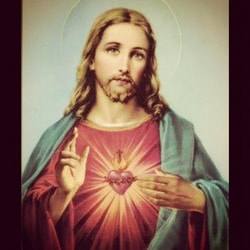
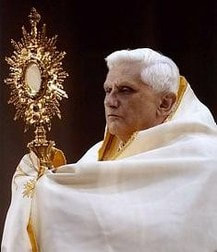
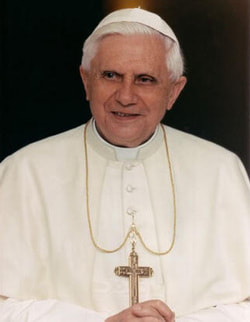
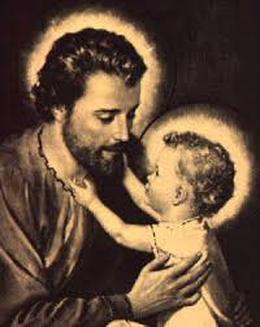
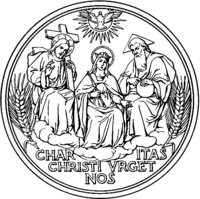
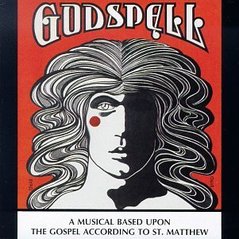
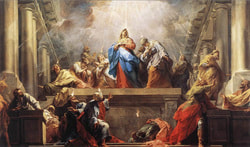

 RSS Feed
RSS Feed